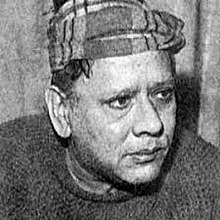Tanvir Naqvi
Tanvir Naqvi (born Syed Khursheed Ali; 16 February 1919 – 1 November 1972), also spelled Tanveer Naqvi, was a Pakistani lyricist and poet. He wrote lyrics for 200 uncertain films, including Lollywood and Bollywood.[1] He made his debut in Indian cinema with Swami film directed by Abdul Rashid Kardar[2], and later remained active in Pakistani film industry for over fifteen years.[3] He earned recognition after writing "Aawaz De Kaha Hai" song for Anmol Ghadi film.
Tanvir Naqvi | |
|---|---|
 Syed Khursheed Ali a.k.a. Tanvir Naqvi | |
| Native name | تنویر نقوی |
| Born | Syed Khursheed Ali February 16, 1919 Lahore, British India |
| Died | November 1, 1972 (aged 53) Lahore, Pakistan |
| Pen name | Tanvir Naqvi |
| Occupation | Lyricist, Poet |
| Language | Urdu, Punjabi |
| Nationality | Pakistani |
| Genres | Gazal, Nazm |
| Spouse | Eidan Bai |
| Musical career | |
| Origin | Iran |
| Occupation(s) | Songwriter |
| Years active | 1946–1972 |
| Associated acts | |
He was born in Lahore, British India (in modern-day Lahore, Pakistan). He originally belonged to a family of Persian writers from Iran, and married Noor Jehan's sister, Eidan Bai.
Career
As a lyricist, he started his career around 1946 at early age, but after moving to Pakistan, he wrote lyrics for Urdu and Punjabi language films, including Pakistan's first feature film Teri Yaad and the first film Noor Jehan was introduced as a playback singer, Salma (1960).[2] In 1933, he went to Bombay when a film director Abdur Rashid Kardar invited him there. Prior to his debut in films, he was writing gazals, but later used to wrote songs for Hindi, Urdu and Punjabi films. He is also credited for writing lyrics for Pakistan's patriotic song titled "Rang Laye Ga Shaheedon Ka Lahoo", sung by Noor Jehan. He wrote this song from one of his poems. During his career, he wrote two prominent naats such as "Shah-e-Madina Yasrab Ke Wali" and "Jo Na Hota Tera Jamal Hi".[4] Before the split of Indian subcontinent, Naqvi was recognized one of the greatest classical writers in Punjabi poetry and literature between 1950s and 1970s.[5]
After partition, the Pakistan film industry didn't produce much films, and by the end of 1952, it made only five films. Later, Khwaja Khurshid Anwar, a Pakistani filmmaker teamed up with severals other people, including Tanvir Naqvi as song writer. The team succeeded making some films between 1956 and 1958, focused on psychological issues experienced by actors due to multiple cultural conflicts.[6]
Filmography
| Remarks denote a short description of the work where available. |
| # | Title[2] | Year | Type/Credited as | Remarks |
|---|---|---|---|---|
| 1 | Anmol Ghadi | 1946 | Lyricist | N/A |
| 2 | Jugnu | 1947 | Lyricist | N/A |
| 3 | Teri Yaad | 1948 | Lyricist | N/A |
| 4 | Naata | 1955 | Lyricist | N/A |
| 5 | Jhoomar | 1959 | Lyricist | N/A |
| 6 | Neend | 1959 | Lyricist | N/A |
| 7 | Koel | 1959 | Lyricist | N/A |
| 8 | Salma | 1960 | Lyricist | N/A |
| 9 | Ghunghat | 1962 | Lyricist | N/A |
| 10 | Hamraaz | 1967 | Lyricist | N/A |
| 11 | Behan Bhai[7] | 1969 | Scriptwriter | N/A |
| 12 | Att Khuda Da Vair | 1970 | Lyricist | N/A |
Death
He died on 1 November 1972 in Lahore, Pakistan.[3]
References
- "Lyricist Tanvir Naqvi being remembered today | SAMAA". Samaa TV.
- Kahlon, Sukhpreet (1 November 2017). "Remembering the progressive poet and thinker Tanveer Naqvi". Cinestaan. Retrieved 21 July 2020.
- "Progressive Poet, Thinker Tanveer Naqvi Remembered". UrduPoint.
- "Maestro of Indo-Pakistani Cinematic Poetry". 13 March 2020.
- "Remembering the iconic music composer duo Bakhshi-Wazir". 16 March 2019.
- "Revolutionary musician | Art & Culture | thenews.com.pk". www.thenews.com.pk.
- "Classic film 'Behan Bhai' to be screened on March 18". 16 March 2017.